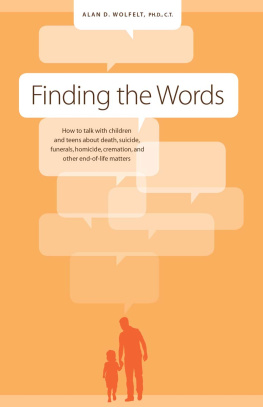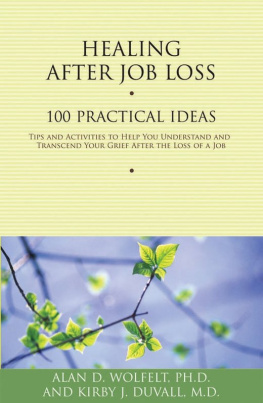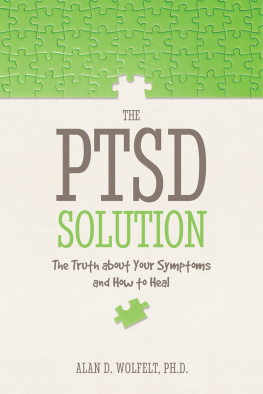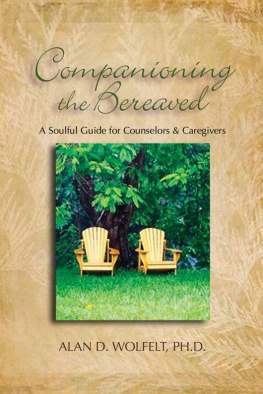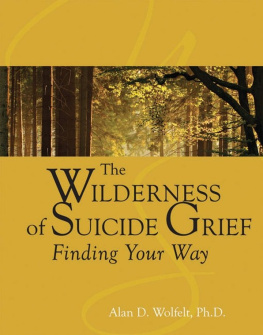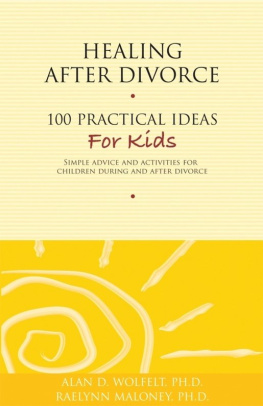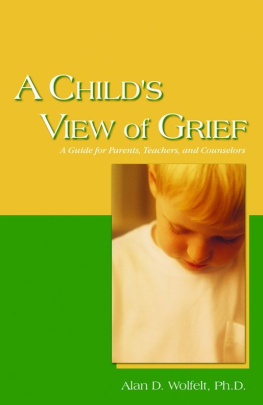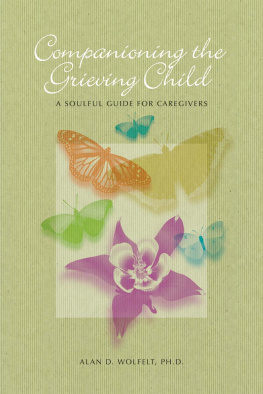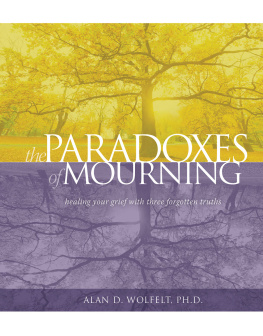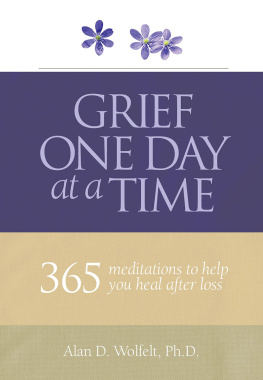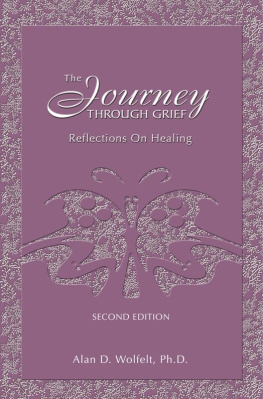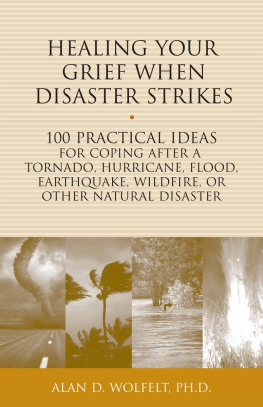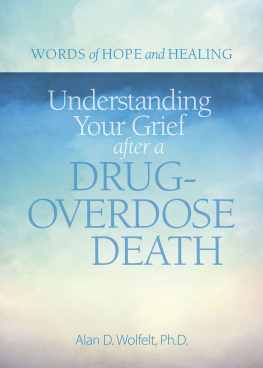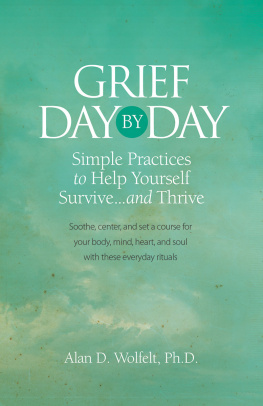Companion Press is dedicated to the education and support of both the bereaved and breavement caregivers. We believe that those who companion the bereaved by walking with them as they journey in grief have a wondrous opportunity: to help others embrace and grow through griefand to lead fuller, more deeply lived lives themselves because of this important ministry.
For a complete catalog and ordering information, write or call or visit our website.
 | Companion Press |
| The Center for Loss and Life Transition |
| 3735 Broken Bow Road | Fort Collins, CO 80526 |
| Phone: (970) 226-6050 | Fax: 1-800-922-6051 |
2013 by Alan D. Wolfelt, Ph.D.
All rights reserved. No part of this publication may be reproduced, stored in a retrieval system, or transmitted in any form or by any means, electronic, mechanical, photocopying, recording or otherwise, without the prior permission of the publisher.
Companion Press is an imprint of the Center for Loss and Life Transition
3735 Broken Bow Road, Fort Collins, CO 80526
(970) 226-6050
www.centerforloss.com
Companion Press books may be purchased in bulk for sales promotions, premiums, or fundraisers. Please contact the publisher at the above address for more information.
Printed in the United States of America
18 17 16 15 14 13 5 4 3 2 1
ISBN 978-1-61722-189-7
Contents
CHAPTER ONE
Childrens griefwhy its unique
CHAPTER TWO
Companioning children through grief
CHAPTER THREE
When a parent dies
CHAPTER FOUR
When a sibling dies
CHAPTER FIVE
When a grandparent dies
CHAPTER SIX
When a pet dies
CHAPTER SEVEN
When a friend or classmate dies
CHAPTER EIGHT
When someone dies by suicide
CHAPTER NINE
When someone dies by homicide or manslaughter
CHAPTER TEN
When someone close has a terminal or life-threatening illness
CHAPTER ELEVEN
When the child is dying
CHAPTER TWELVE
Attending a funeral or ceremony
There can be no keener revelation of a societys soul than the way in which it treats its children.
NELSON MANDELA
Introduction
I have had the privilege of companioning thousands of people on their grief journeys over the years, including many children and teens. It is an honor to be a part of the intimate workings of grief and mourning. With each new person I meet, I learn something about this necessary and important response to the death of someone loved. I believe I have an obligation to teach others what I have learned about the sacred journey we call grief.
We live in a society where people are encouraged to move around grief instead of through grief. I daresay that we as a North American culture have become confused. Theres no time to grieve or mourn; rather, children and adults hear such messages as Carry on, Keep your chin up, Shes in a better place, and You just need to let go. Our friends, family, coworkers, and acquaintances encourage us to stay busy and avoid the feelings grief brings. In fact, we get the message that not showing our feelings is being strong and a sign that we are doing well.
I believe it would be accurate to say that we live in an emotion-phobic society. If you, or a child you care for, have experienced the recent death of someone you love, I strongly encourage you to stand against these social and cultural messages and instead embrace your normal and natural grief openly as you actively express your pain through mourning.
You and the grieving child must walk hand-in-hand through the wilderness of grief despite the scary, dark shapes that may line your path. It takes bravery to walk through grief and actively mourn. But if you can, the reward is reconciliation of the pain and the promise of a transcendent future filled with purpose and meaning.
Mourning is essential to healing
Authentic mourninggrief honestly expressed on the outside demands that you slow down, befriend dark emotions, and seek and accept support. Over time, if you actively grieve and mourn, you will begin to acknowledge the death and appropriately shift the relationship to one of loving memory. You can never fully leave grief behind, but with time and care it can change from overwhelming and debilitating to survivable and sometimes even inspiring. This is as true for children as it is for adults.
Avoiding or suppressing grief is harmfuleven to kids
While families may be tempted to make swift, clean breaks from their loss, it does not ultimately serve them. When people do not feel or act on their feelings, they become unable to be changed by them. Feelings do not just resolve on their own. If ignored, they get lodged deep in our hearts, spirits, and bodies and can cause harm in the form of physical ailments or an overall sense of sadness, hopelessness, numbness, or disconnection. In other words, unexpressed grief results in chronic grief, sometimes resulting in depression, anxiety, disconnection from others, substance abuse, and fatigue. This carried grief results in a muting of ones spirit or divine spark.
The saying Time heals all wounds is misleading, as the passing of time without the willingness to experience grief and mourning does not open us to healing.
THE DIFFERENCE BETWEEN GRIEF AND MOURNING
Grief is the internal thoughts and feelings of loss and pain when someone loved dies. Mourning is the outward, shared expression of that grief, or grief gone public. All children grieve when someone they love dies. But if they are to heal and grow into their potential, they must be provided a safe, accepting atmosphere in which to mourn.
Grief is a process, not an event
Grief does not end when the funeral is over or the belongings dispersed. There are no timelines or set stages of grief. Mourners dont follow any rules, and no two people will grieve in the same way. Children, especially, are unique in their grief because their age, stage of development, and life experiences thus far strongly influence their ability to understand and integrate the grief that has touched their young lives. Thats why it is essential for them to have loving, caring adults who are unafraid of the pain and emotions a deep loss can bring. Adults who can open to pain and have the patience to allow it to unfold naturally are valuable and true companions to children in grief. Since you have chosen this book, I commend you for your bravery and willingness to walk alongside a child on his or her journey through grief.
To companiongrieving children means to be an active participant in their healing. When you companion a grieving child, you allow yourself to learn from his unique experiences. You let him be the teacher instead of the other way around. You walk beside him, not in front of or behind him. You see the world from his eyes. You accept his pain and the unique way he expresses it as the way it should be without telling him how he ought to feel or act. You especially do not suggestgetting over his pain or denying his pain, as denying stops the loss from integrating from his head to his heart, leaving him stunted and unable to embrace the fullness of life.
THE TENETS OF COMPANIONING THE BEREAVED
TENET ONE
Companioning is about being present to another persons pain; it is not about taking away the pain.
Next page
